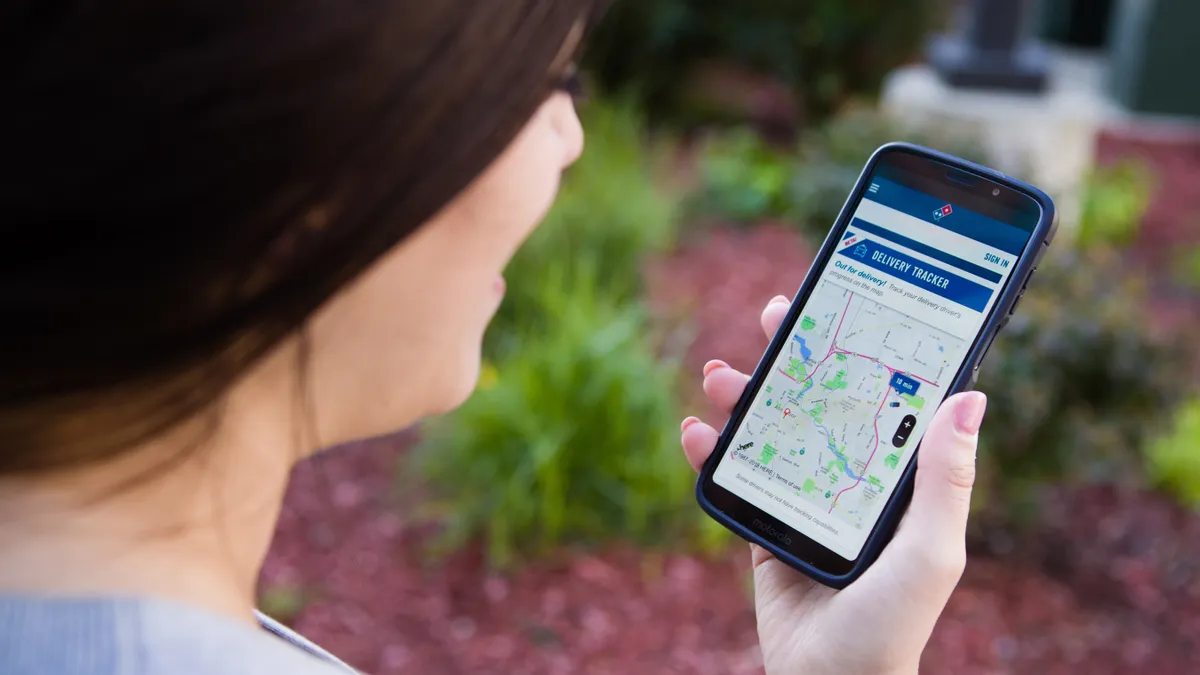Dive Brief:
- Domino's is testing GPS driver tracking in 27 corporate-owned locations across Phoenix, according to a company release. The pilot will expand to stores in select Michigan, Virginia and Washington markets later this spring.
- Customers can track their pizza's journey via the Domino's app or through the order confirmation page of Dominos.com. Diners will also be given an estimated delivery time and can choose to receive SMS notifications that inform them when their order is two minutes away.
- The new technology also gives delivery drivers optional navigation and one-touch customer callback options. Store managers will also have access to driver-tracking screens at their stores, allowing them to make more efficient deliveries and better manage store operations.
Dive Insight:
Domino's continues to try to take some of the wind out of third-party delivery's sales. The company has steadily amassed a host of competitive delivery technologies, including in-car ordering, hotspots and drone delivery tests. The company is also focusing on fortressing, or strategically splitting a franchisee's territory, to cut down delivery times and improve access to its carryout business. The GPS tracking feature could potentially benefit all of these delivery methods, and streamline communications between store, driver and customer — efficiency that could grow its pizza delivery lead.
Customers have cited issues with the chain's past delivery trackers, however. In 2017, The Wall Street Journal reported that customers found several inaccuracies within the pizza-tracking app, including incorrect information about order location, delivery status and driver names. The company said anomalies like this are unusual, but if they persist with this update, it could hurt consumer trust. It is not known if this latest tracker rectifies some of these past problems.
Major platforms like DoorDash and Uber Eats have been flexing up their technology as they eye pizza market share, with the latter recently launching a five-point delivery tracker — an asset made possible by parent company Uber's proprietary tracking tech and logistics data.
These investments have paid off so far, despite the pizza segment's delivery prowess. In February, Pizza Hut began a pilot delivery program with Grubhub, and just last month Papa John's announced that it would take its DoorDash partnership nationwide. But Domino's has made it clear that it will not hand over its delivery business to an outsider, and this new GPS tracker appears to be a defensive move.
The company admitted last week that increased ad spending and discounted delivery promotions from third-party aggregators hurt its same-store sales growth during Q1 2019. CEO Ritch Allison said that he thinks this will only be a short-term impact, since these delivery platforms siphon restaurant profits and eat up market share across segments. Allison also said that by not partnering with these companies, Domino's is able to maintain control over service, food quality, franchisee profitability and perhaps most importantly, customer data.
Though many restaurants view third-party partnerships as a shortcut to competitive delivery capabilities, the strategy has already failed some major brands. Most recently, leaked documents revealed that McDonald's is reconsidering its exclusive partnership with Uber Eats. A memo obtained by Bloomberg reportedly showed that the fast food giant wants to reduce fees for its U.S. franchisees and give them the option to use other delivery partners. Steep delivery fees are one of the main complaints outlined by McDonald's operators, which has been pushing corporate for changes.














